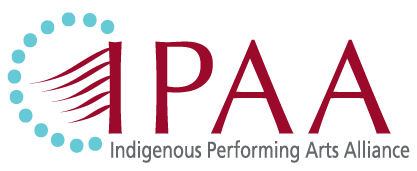
Data Sovereignty Strategy
IPAA’s Commitment to Open Data and Indigenous Data Sovereignty
Click to view as plain text PDF.
Linked and Open Data
The Indigenous Performing Arts Alliance (IPAA) team is currently working with the Linked Digital Future Initiative to interconnect publicly available information in the IPAA membership directory with Artsdata and with open databases such as Wikidata.
The Linked Digital Future Initiative is providing the technical know-how to format the information held by IPAA into linked, open data and to add it to the Artsdata knowledge graph so that artists, organizations, and events can be more easily connected to online.
Benefits of making IPAA member information linked and open
Benefits related with principles of Indigenous data sovereignty
- Exercise ownership and control over what information and data circulates about you in the web of open data. “Nothing about us, without us”. In keeping with principles of Indigenous data sovereignty, we want you to be able to control what information about you is made available as open data. This is achieved by providing quality, up-to-date info about you in the IPAA membership directory.
- Reinforce IPAA as the primary source of information about Indigenous artists in Canada. We will create a flow of information and data that will take its source at the IPAA membership directory, and we will make sure that the provenance remains traceable as the data flows downstream. In doing so, IPAA positions itself as a recognized authority on Indigenous performing arts and its practitioners.
- Make information about you and your work findable and accessible by stewards of Indigenous data holdings.
- Access existing open data about IPAA members and their work, assemble it with your member data and populate this rich information back into the IPAA membership directory.
Benefits associated with the realities of the digital economy
- When information about the performing arts is turned into linked open data, it can more easily be found and processed by applications such as search engines. This means people who look you up over Google Search or Alexa will be delivered more accurate and detailed results (also known as rich results), highlighting your latest work, and inviting users to check your streaming platform or social media accounts.
- This linked open data can be reused by other performing arts sector stakeholders. For example, it could be automatically populated into comprehensive event listings that would feature your artist bio in-sync with the bio in the IPAA membership directory.
Our Commitment to Principles of Indigenous Data Sovereignty
IPAA affirms its commitment to do things according to Indigenous principles.
We are taking a two-eyed approach by following both FAIR principles and CARE principles.
FAIR is a set of principles for data management and stewardship;
FAIR stands for: Findable, Accessible, Interoperable, and Reusable.
CARE is a set of principles for Indigenous data governance;
CARE stands for: Collective benefit, Authority to control, Responsibility, and Ethics.
We will be abiding by the principles of the
First Nations Data Governance Strategy:
- Community-driven and Nation-based
- Ownership, Control, Access and Possession of First Nations’ data by First Nations (OCAP®)
- Reciprocal, respectful relationships
- Transparency and Accountability
- Quality Community–driven Standards and Indicators
- Nation (Re)Building
- Equity and Capacity
- Effective Technology and Policy
How this Affects you as an IPAA Member?
We would like you to be aware of what kind of information we want to publish as linked open data;
Individuals (Indigenous Artists and Allies)
- Name
- Name “Also Known As”
- Pronouns (optional)
- Main discipline(s) or genre(s)
- Occupation (what they do: for example, Dancer, Director, Writer, Actor, Singer-Songwriter)
- Artistic Bio
- City/Township & Province
- Link to official image (we won’t be releasing the image itself as open data)
- Official website link
- Social media links
- Links to external database: Wikidata, Wikipedia
- Country of citizenship (for Wikidata)
- Indigenous group identification (First Nation, Metis, Inuit, Other)
- Disambiguating description, “How do you self-identify?”
Organization Members
- Company Name
- Name, “Also Known As”
- Language of Name
- Main discipline(s) or genre(s)
- Location
- Legal form
- Business Number (if applicable and not displayed on profile)
- Current holder(s) of leadership
Publishing this information as linked open data means it can be read and used by anyone, for any purpose. While this can be seen as a risk and a loss of control, we believe it is actually a means of exercising control by deciding what information is available online in an intentional way.
Fill in the form carefully and come back regularly to update your information as needed.
Questions?
If you have questions about anything in this form and/or the Linked Digital Future Initiative and the collaboration with the IPAA please contact: Brit Johnston; brit@ipaa.ca.
Additional Information
IPAA has been working in collaboration with the CAPACOA’s Linked Digital Future Initiative and with Culture Creates to implement this data sovereignty strategy.
About the Linked Digital Future Initiative (LDFI)
The Linked Digital Future Initiative (LDFI) is a multi-year project led by the Canadian Association for the Performing Arts (CAPACOA). The LDFI is funded by the Government of Canada and the Canada Council for the Arts.
Why does the LDFI exist? / Why we take on this project
Currently, much of the information about the performing arts sector (including Indigenous performers, directors, choreographers, organizations, venues and events listed in our IPAA member directory) is not properly formatted to be found, read and processed by search engines and other discovery technologies. As a result, it’s too often being ignored or under-utilized.
About Culture Creates
Culture Creates is a semantic technology agency offering a range of services and practical applications to facilitate the sharing and use of metadata in the arts and culture sector. The company focuses on developing semantic infrastructures of usable ‘arts’ data as well as practical easy-to-use applications for the arts community to both band together and use a combined data resource.

